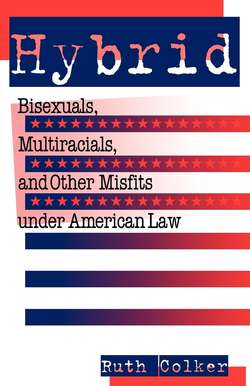Читать книгу Hybrid - Ruth Colker - Страница 8
На сайте Литреса книга снята с продажи.
Acknowledgments
ОглавлениеMany people have assisted with the writing of this book through their inspiration, thoughtful conversations, devoted research, or careful reading of various drafts. The first inspiration came from Professor Ruthann Robson, who encouraged me to develop a “bisexual jurisprudence”—a jurisprudence that eventually broadened to encompass far more than bisexuality. Richard Delgado and Jean Stefancic, editors of the Critical America series, also served as valuable inspiration by offering to publish this work at a very early stage of production. Later inspiration came from the courageous writings of Dean Gregory Howard Williams and Professor Judy Scales-Trent, who have described vividly how it feels to live across the color line. Professor Linda Alcoff not only shared her experiences of living between ethnic categories with others but was gracious enough to offer me encouragement when I spoke with her about my own project.
Faculty at the University of Pittsburgh School of Law, as well as the students in my classes on constitutional law, feminist theory, and disability discrimination, have engaged in many lively conversations with me regarding these ideas as they developed. In particular, I benefited enormously from two faculty work-in-progress sessions at the School of Law and a symposium held at Yale Law School. Individual faculty members at the University of Pittsburgh also talked extensively with me about many of these ideas, including Jody Armour, Lisa Brush, Martha Chamallas, and Jules Lobel.
My research assistants were tireless in helping me discover wide-ranging material from the social sciences and law. Namita Luthra, Sharon Noble, Debra Sherman, and Colleen Zak have helped with nearly every idea contained in each chapter. In addition, my colleague, Bernie Hibbitts assisted me in finding valuable historical material on the U.S. Census. The word-processing staff at the School of Law, under the supervision of LuAnn Driscoll, did a marvelous job of polishing the typing, as well as proofreading a lengthy manuscript. Finally, the School of Law generously funded this research through summer writing grants and extra provision of research assistants in a time of fiscal austerity. I am very grateful.
As for careful reading of numerous drafts, no one deserves higher praise than my editor at New York University Press, Niko Pfund. Niko’s gracious edits, sensitivity to the ideas underlying my project, and positive feedback enriched this project enormously. I cannot imagine a smoother and more helpful editing process than the one offered to me by New York University Press.
And, of course, my family deserves enormous thanks for putting up with the time commitments of this project. To my four-year-old daughter, Cara Colker-Eybel, I thank you for your patience while mommy spent so much time writing “that book.” And to Edward Eybel, my husband, I thank you for all the hours you kept Cara away from my computer so that I could write without too much distraction. I should have more time to devote to the family now, that is, until I undertake the next big project.
